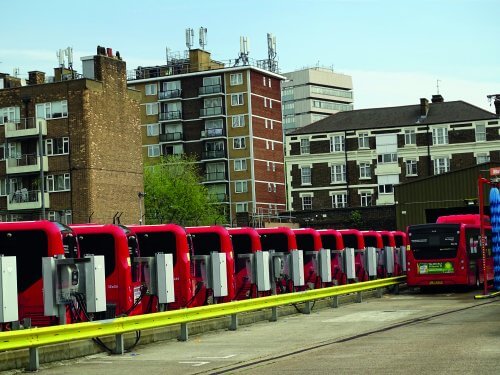
The UK is set to have the largest electric bus fleet in Europe by 2024, with the number of buses projected to grow by close to 180% from approximately 1,000 to 2,800 vehicles, according to forecasts by global advisory firm Accuracy.
Its figures show that Poland currently has the second-largest fleet of zero-emission buses in Europe with around 800 zero-emission (ZE) buses. The Netherlands and Italy have the third and fourth largest fleets with around 600 buses each. Germany only has 550 in its urban fleet, the fifth largest in Europe, and France is in sixth place with around 500, around half the number of ZE buses in the UK currently.
Across Europe, the number of electric buses is forecast to increase by 189% over the next three years with substantial growth in France and the Nordic countries. Despite this, those countries are still forecast to trail the number of UK zero-emission buses in 2024.
UK figures have been boosted by significant onvestment from TfL, which at the beginning of 2021 had more than 400 buses fully powered by electricity. Aurélie Quéromès, Manager at Accuracy said: “The growth in UK’s electric bus fleet has been driven by continued Government investment. Many countries are now stepping up investment into their electric bus fleet to meet their zero-emission targets.”
Accuracy suggested that foreign production of buses and batteries could be a major challenge to domestic manufacturers. China’s li-ion battery production is around ten times that of Europe’s, the firm says, which means domestic manufacturers of electric buses could have their margins squeezed by global competition.
Accuracy says governments across Europe will need to continue to invest and stay on the path to net-zero and help manufacturers
hit production targets as passengers return to public transport. The UK recently surpassed France as Europe’s second largest electric car market, with around 31,800 electric cars sold in the first quarter of 2021.
Aurélie added: “The pandemic has had a huge impact on public transport across the world, so it is more important now than ever that governments continue to commit funds to zero-emission infrastructure. Manufacturers of electric buses may need support in the short term to help restart the supply chain of zero-emission buses. Therefore, governments and private investors could aim to bridge the funding gap between operators and manufacturers to ensure they meet climate change targets in time.”

